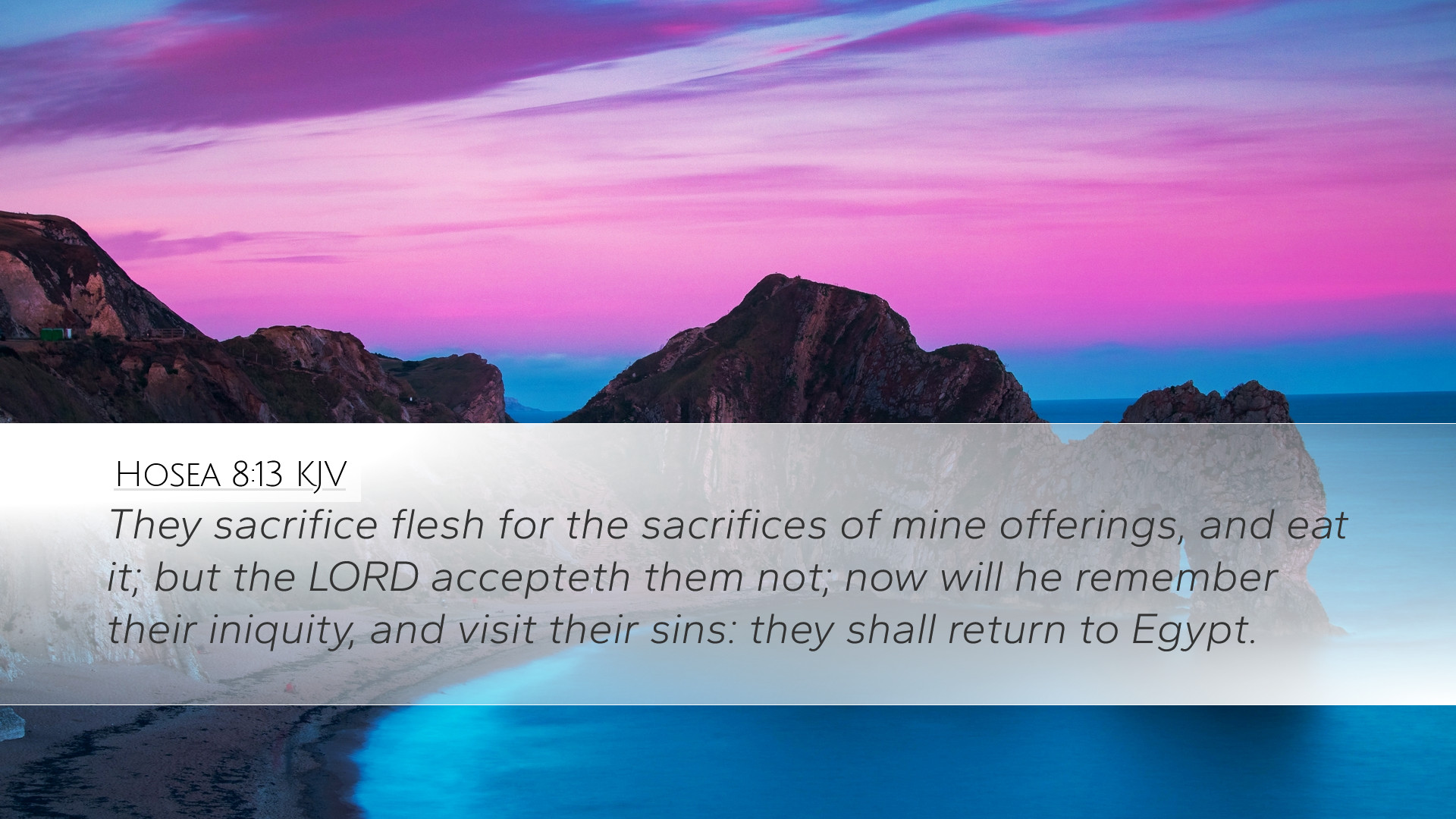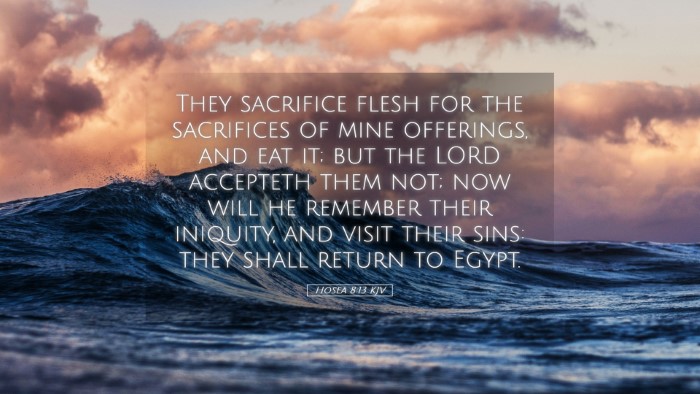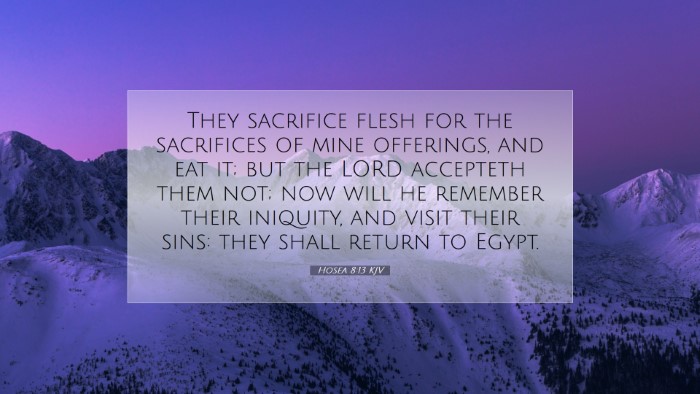Old Testament
Genesis Exodus Leviticus Numbers Deuteronomy Joshua Judges Ruth 1 Samuel 2 Samuel 1 Kings 2 Kings 1 Chronicles 2 Chronicles Ezra Nehemiah Esther Job Psalms Proverbs Ecclesiastes Song of Solomon Isaiah Jeremiah Lamentations Ezekiel Daniel Hosea Joel Amos Obadiah Jonah Micah Nahum Habakkuk Zephaniah Haggai Zechariah MalachiHosea 8:13
Hosea 8:13 KJV
They sacrifice flesh for the sacrifices of mine offerings, and eat it; but the LORD accepteth them not; now will he remember their iniquity, and visit their sins: they shall return to Egypt.
Hosea 8:13 Bible Commentary
Commentary on Hosea 8:13
Bible Verse: Hosea 8:13 - "They sacrifice flesh for the sacrifices of mine offerings, and eat it; but the LORD accepteth them not; now will he remember their iniquity, and visit their sins: they shall return to Egypt."
Introduction
The passage in Hosea 8:13 captures the essence of Israel's failures in worship and obedience to God. It reflects a profound message about the nature of sacrifice and true repentance. The commentaries from renowned theologians shed light on the spiritual implications and the cultural context of this verse.
Exegesis and Theological Insights
Hosea succinctly addresses Israel's hypocrisy in worship. The people were engaged in rituals yet remained distant from God, revealing a critical disparity between their actions and their hearts. The insights from various public domain commentaries enhance our understanding of this passage.
Matthew Henry's Commentary
Matthew Henry emphasizes Israel's misguided worship practices. He highlights that while the Israelites offered sacrifices, the sincerity of their hearts was greatly lacking. They had become so engrossed in the ritual of sacrifice that they neglected the fundamental requirement of heartfelt obedience to the Lord.
Henry urges readers to contemplate the nature of their sacrifices, noting that God looks beyond mere external rituals. "The Lord accepteth them not," he writes, signifying that true worship must spring from a right spirit. This serves as a poignant reminder not to confuse form with substance in our spiritual lives.
Albert Barnes' Analysis
Albert Barnes provides a detailed examination of the terms and imagery used in this verse. He notes that the phrase "sacrifice flesh" reveals the kind of offerings that were being made, which were misdirected and superficial. Barnes indicates that although the people engaged in sacrificial rituals meant to honor God, their hearts were saturated with sin and idolatry.
Barnes posits that this disconnection results in God's rejection of their offerings—He will "remember their iniquity." This line reflects a critical theological principle: that God's acceptance of offerings is contingent upon an honest relationship characterized by repentance and truth. Without such conditions, Israel's sacrifices were to no avail.
Adam Clarke's Commentary
Adam Clarke, known for his analytical approach, discusses the historical context of Israel's idolatry. He ascribes much of Israel’s downfall to a return to Egypt, symbolizing a regression to former sins and bondage. "They shall return to Egypt" serves as an admonition against the consequences of their spiritual unfaithfulness.
Clarke elucidates that the reference to Egypt also indicates a place of slavery and sin. By choosing to pursue idols rather than the true God, Israel forsakes freedom and re-enters a form of spiritual bondage. He connects this return to Egypt with their ingratitude and rebellion against divine guidance.
Implications for the Modern Believer
The layered meanings of Hosea 8:13 provide rich insights applicable to contemporary faith communities. The warnings encapsulated in this verse resonate profoundly with any believer or leader striving for authenticity in their relationship with God.
- The Importance of Sincerity in Worship: The call for genuine worship resonates today, reminding congregations and individuals alike that God desires more than mere ritualistic practices. True worship demands a heart aligned with His will.
- Awareness of Sin: The reminder that God "remembers their iniquity" serves as a sobering message that believers must remain aware of their shortcomings. Regular confession and acknowledgment of sin are pivotal in restoring one’s relationship with God.
- The Dangers of Idolatry: Clarke's reference to a spiritual return to Egypt speaks to the contemporary believer's need to be vigilant against modern idols, which can take many forms, such as materialism or an overemphasis on cultural acceptance.
- Repentance and Forgiveness: As God is described as remembering iniquity, believers are called to embrace the Gospel's message—proclaiming that in Christ, forgiveness and restoration through genuine repentance are always available.
- The Nature of True Sacrifice: Understanding that any sacrifice must come from a heart of love and obedience encourages believers to evaluate the motivations behind their offerings to God.
Conclusion
Hosea 8:13 serves as a powerful admonition to both ancient Israel and modern believers. By exploring the insights of Matthew Henry, Albert Barnes, and Adam Clarke, we uncover a rich tapestry of theological wisdom highlighting the importance of sincerity, awareness of sin, and the dangers of idolatry in worship.
As pastors, students, theologians, and scholars reflect on Hosea's words, may we strive to cultivate hearts that reflect genuine love for God, ensuring our sacrifices are reflective of true devotion and not mere ritual.


